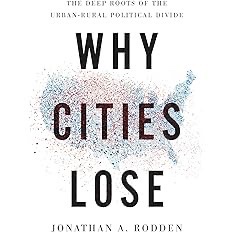Jonathan Rodden

Author and Professor of Political Science, Senior Fellow at the Hoover Institution and at the Stanford Institute for Economic Policy Research
Currently available from Basic Books
Interested?
Click on the Book Cover
A prizewinning political scientist traces the origins of urban-rural political conflict and shows how geography shapes elections in America and beyond
Why is it so much easier for the Democratic Party to win the national popular vote than to build and maintain a majority in Congress? Why can Democrats sweep statewide offices in places like Pennsylvania and Michigan yet fail to take control of the same states’ legislatures? Many place exclusive blame on partisan gerrymandering and voter suppression. But as political scientist Jonathan A. Rodden demonstrates in Why Cities Lose, the left’s electoral challenges have deeper roots in economic and political geography.
In the late nineteenth century, support for the left began to cluster in cities among the industrial working class. Today, left-wing parties have become coalitions of diverse urban interest groups, from racial minorities to the creative class. These parties win big in urban districts but struggle to capture the suburban and rural seats necessary for legislative majorities. A bold new interpretation of today’s urban-rural political conflict, Why Cities Lose also points to electoral reforms that could address the left’s under-representation while reducing urban-rural polarization.
My research and teaching interests are at the intersection of political science, public economics, and geography.
“For over 20 years I have been working on issues related to federalism and various forms of fiscal and political decentralization around the world. In addition to academic research, I have been engaged in policy debates in North America, Europe, Latin America, and Africa in collaboration with the IMF, World Bank, European Central Bank, and OECD. I recently collaborated with USAID on an edited volume on fiscal decentralization, and on some experiments related to local accountability in Africa”.
Much of my recent research focuses on political and economic geography. I published a book on the topic in 2019, and I have written a series of papers on the ways in which electoral districts, when superimposed on patterns of residential geography, can shape representation and public policy. I have also been involved in policy debates about redistricting, and I have written amicus briefs for the Supreme Court of the United States, and testified in a number of trials in federal and state court related to redistricting and voting rights.
I am the founder and director of the Stanford Spatial Social Science Lab– a center for research and teaching focusing on geospatial analysis in the social sciences.
Jonathan Rodden is a professor in the political science department at Stanford who works on the comparative political economy of institutions. He has written several articles and three books on federalism and fiscal decentralization. One of those books, “Hamilton’s Paradox: The Promise and Peril of Fiscal Federalism,” was the recipient of the Gregory Luebbert Prize for the best book in comparative politics in 2007. He works with institutions including the World Bank, International Monetary Fund, USAID, and the European Parliament on issues related to fiscal decentralization and federalism.
He has also written papers on the geographic distribution of political preferences within countries, legislative bargaining, the distribution of budgetary transfers across regions, and the historical origins of political institutions. He has written a series of papers applying tools from mathematics and computer science to questions about redistricting, culminating in a 2019 book called “Why Cities Lose: The Deep Roots of the Urban-Rural Political Divide” (Basic Books). Jonathan has also embarked on an inter-disciplinary collaborative project focused on handgun acquisition.
Jonathan received his PhD from Yale University and his BA from the University of Michigan, and was a Fulbright student at the University of Leipzig, Germany. Before joining the Stanford faculty in 2007, he was the Ford Associate Professor of Political Science at the Massachusetts Institute of Technology.
Other Affiliation:
Director of the Spatial Social Science Lab at Stanford
He has written several articles and three books on federalism and fiscal decentralization. One of those books, “Hamilton’s Paradox: The Promise and Peril of Fiscal Federalism,” was the recipient of the Gregory Luebbert Prize for the best book in comparative politics in 2007. He works with institutions including the World Bank, International Monetary Fund, USAID, and the European Parliament on issues related to fiscal decentralization and federalism.
Latest Blogs:
- The great recession and the public sector in rural America JOURNAL OF ECONOMIC GEOGRAPHYRodden, J.2023More
View details for DOI 10.1093/jeg/lbad015
View details for Web of Science ID 001023943000001
